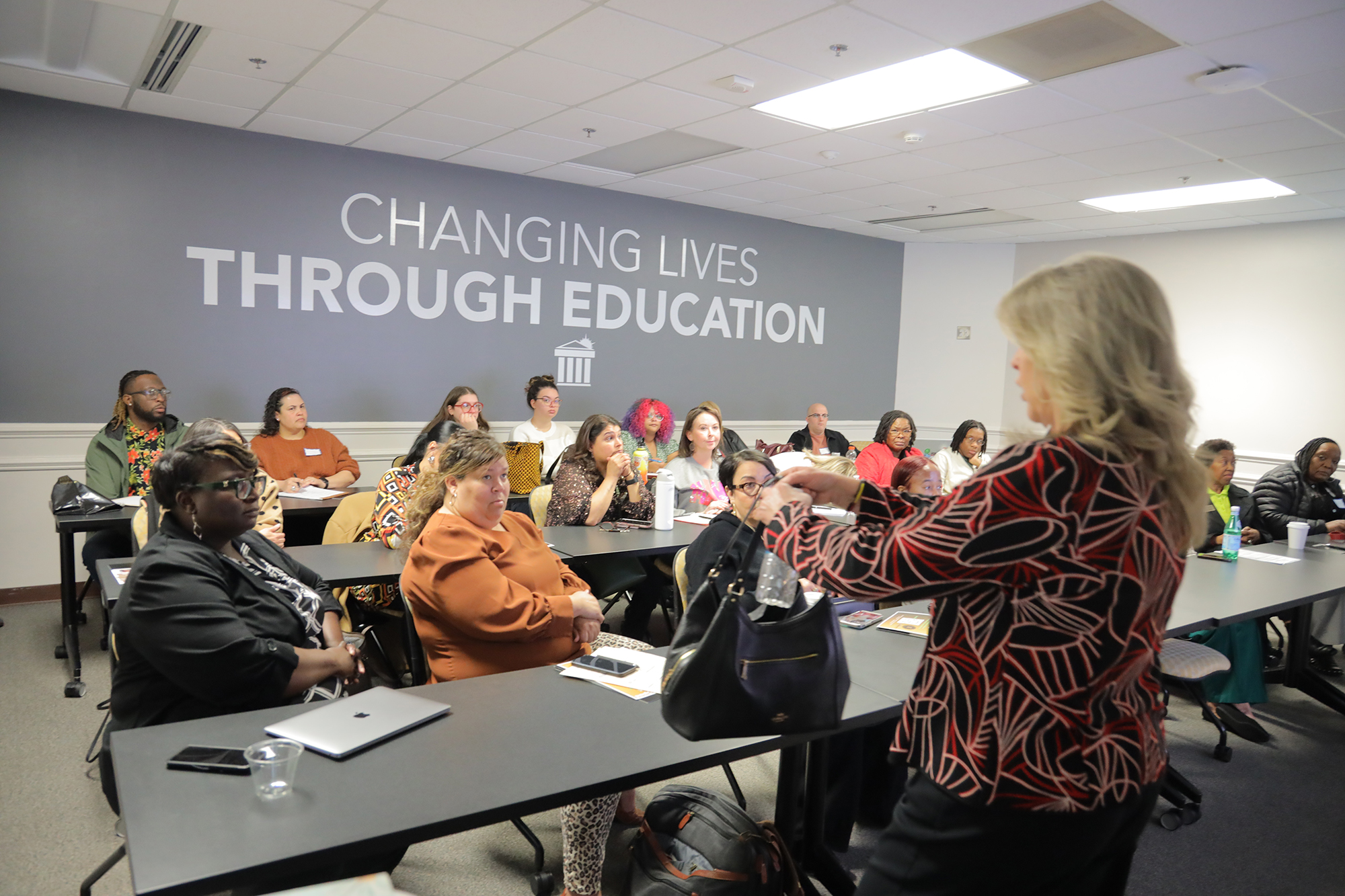
Social Work (MSW)
Find your path forward with a Master of Social Work (MSW) from UNC Pembroke. We offer a Traditional MSW and an Advanced Standing MSW. Designed for working adults, the program offers flexible options. Choose to take classes online, hybrid, part-time, full-time or advanced standing. Be prepared to make an impact in clinical, healthcare and community settings.
Degrees

| Semester | Application Deadline | Classes Start |
|---|---|---|
| Summer I, '26 (Advanced Standing) | Feb. 15, 2026 | May 26, 2026 |
| Fall, '26 (Traditional) | Feb. 15, 2026 | Aug. 17, 2026 |
The MSW Experience
UNCP's MSW program combines rigorous academics with real-world experience. You'll gain practical skills both in the classroom and through a faculty-supported practicum based in North Carolina. Rooted in social justice and aligned with the NASW Code of Ethics, the program prepares you to serve diverse, rural and underserved communities — whether you're beginning your social work journey or building on a BSW.
With flexible options — including full-time or part-time schedules and hybrid or fully online delivery — you can earn your degree on your terms.
Full Time Plan of Study 2 Years
Part Time Plan of Study 3 Years
Part Time Plan of Study 4 Years
Virtual Information Sessions
Click the links to register.
Fast-Track Your MSW Experience with Advanced-Standing
Already have a CSWE-accredited BSW?
With Advanced Standing, you can complete your Master of Social Work in just 12 months
full-time or 24 months part-time. This accelerated pathway puts you on the fast track
to a rewarding career grounded in advocacy, service and meaningful change.
Plan of Study 1 year Plan of Study 2 year

Certificate in Substance Use Disorder Treatment and Recovery
Gain specialized training in a growing field with UNC Pembroke’s Graduate Certificate
in Substance Use Disorder Treatment and Recovery. Designed for current Master of Social
Work students, this 12-hour program builds essential skills to assess, treat and support
individuals facing substance use challenges. Approved by the NC Addictions Specialist
Professional Practice Board, the certificate also meets Criteria C for LCAS eligibility.

How to Prepare
To be eligible for admission, applicants must meet the following GPA and degree requirements based on their preferred program format:
Fully Online Program:
- Bachelor's degree from a regionally accredited university
- Minimum 3.0 GPA (overall or in the major) or a graduate degree with a 3.0 GPA
Hybrid Program (on-campus sessions):
- Bachelor's degree from a regionally accredited university
- Minimum 2.75 GPA (overall or in the major) or a graduate degree with a 2.75 GPA
Advanced Standing Program:
- Bachelor of Social Work (BSW) from a CSWE-accredited program (or international equivalent recognized by CSWE)
- Degree must have been earned within the last 5 years
- Minimum 3.2 overall GPA
GPA Exceptions (Hybrid Program Only):
Applicants with a GPA below 2.75 may still be considered if they meet one of the following:
- 3.0 GPA in the last 60 hours of undergraduate coursework
- 3.0 GPA in a completed graduate degree
- 3.0 GPA in at least 9 hours of completed graduate-level coursework
- GRE scores: 148 (Verbal), 145 (Quantitative), 3.5 (Analytical Writing)
- A high composite score on admission materials (essay, recommendations, etc.)
All applicants must demonstrate foundational knowledge in key academic areas.
Applicants without a BSW must have completed:
- 9 credit hours in humanities/fine arts
- 9 credit hours in social sciences
- 3 credit hours in statistics
Applicants with a BSW must have completed:
- 3 credit hours in statistics
CLEP Exams:
Some prerequisite areas may be fulfilled by CLEP exams. Learn more at CLEP.
You must submit at least three recommendations from academic or professional references who can speak to your:
- Readiness for graduate-level study
- Commitment to social work values
- Professionalism, leadership and/or advocacy experience
Tips: Avoid personal references. Choose individuals who are familiar with your academic work, volunteer service or job performance in human services settings.
The required admission essay should be 4–6 pages, typewritten and double-spaced. It must be your own work and demonstrate graduate-level writing and critical thinking.
Your essay should include two sections:
- Autobiographical Statement (2–3 pages):
Share your background, including life experiences, personal values and what draws you to the field of social work. You may wish to highlight:- Commitment to social justice
- Leadership experiences
- Academic achievements
- Work or volunteer experience with diverse communities
- Bilingual skills or experience overcoming adversity
- Career goals and how an MSW supports them
- Social Problem Analysis (2–3 pages):
Choose a significant social issue and explore:- Societal causes and impacts
- Why it deserves public attention and resources
- Any personal connection to the issue
- How social workers (and you) could address the problem
All MSW students are required to complete an in-person field practicum at an approved health or human services organization in North Carolina. This applies even if you're in the fully online program.
Hours Required:
- Traditional MSW: 930 hours
- Advanced Standing: 500 hours
Field education is an essential part of MSW training. You will gain hands-on experience through a required North Carolina-based practicum. Depending on your path, you'll complete either 500 or 930 hours in a setting that matches your goals and supports licensure readiness.
Beyond Graduation

This program is helping me reach my ultimate goal — to help people. Earning my clinical social work license and getting into the field quickly means I can start making a difference right away. Helping others while doing what I love — that's the dream.
Matthew Miles
Master of Social WorkCommon Careers
- Clinical social work
- Substance use disorder treatment
- Medical and school social work
- Community advocacy
- Public policy and research
- Nonprofit management
- Trauma-informed care

Have questions?
or call us at 910.521.6271
Faculty & Staff

Shannon Cousineau
Assistant Professor of Social Work - MSW Program Director
shannon.cousineau@uncp.edu910.775.4267



Similar Programs

UNCP Social Work is accredited by the Council on Social Work Education's Board of Accreditation. Accreditation of a baccalaureate or master's social work program by the Council on Social Work Education's Board of Accreditation indicates that it meets or exceeds criteria for the assessment of program quality evaluated through a peer review process. An accredited program has sufficient resources to meet its mission and goals and the Board of Accreditation has verified that it demonstrates compliance with all sections of the Educational Policy and Accreditation Standards. Accreditation applies to all program sites and program delivery methods of an accredited program. Accreditation provides reasonable assurance about the quality of the program and the competence of students graduating from the program.

